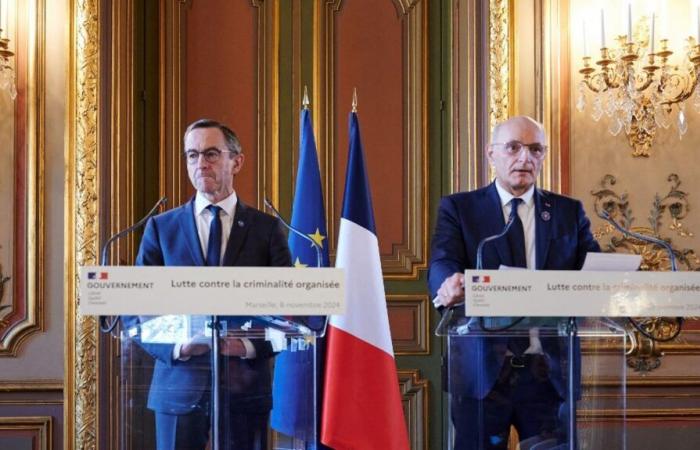Traveling to Marseille, the Ministers of the Interior and Justice demonstrated their desire to strengthen police and judicial resources against drug trafficking.
“National fight, national cause, national unity.” Bruno Retailleau and Didier Migaud unveiled a series of measures to fight against “threat (…) multifaceted, growing, sprawling” drug trafficking. Repentant status, additional resources… The Ministers of the Interior and Justice took advantage of a trip to Marseille, Friday, November 8, to make their announcements, after several deadly shootings in France.
After a meeting with Benoît Payan, the socialist mayor of the Marseille city, and associations of victims of assassinations linked to drug trafficking, Bruno Retailleau and Didier Migaud unveiled their measures, already discussed privately with Prime Minister Michel Barnier the day before. Several of them will be integrated into a text proposed by the Senate and which will be studied on January 27. Franceinfo summarizes what you need to remember.
Additional resources for the police and justice
Several existing structures will be reinforced. “The teams of the Paris prosecutor's office working on the fight against organized crime at the national level will thus be strengthened by 40%”announced the Minister of Justice. “The workforce will be protected throughout the territory and particularly in Marseille, and we will also strengthen the prosecutors who need it.” Five judge positions will be created in Paris, “the team around the magistrates will be consolidated, and we will also strengthen what needs to be strengthened in the JIRS [juridictions inter-régionales spécialisées]“.
Didier Migaud also said “favorable to strong management built around a real national prosecutor’s office”. A direct allusion to the “national anti-narcotics prosecution” (Pnast) project that the senatorial commission of inquiry had called for in its report. “To put this new structure in place, Parliament will have to legislate”recalled the Minister of Justice.
The Minister of Justice also announced the creation “in the coming weeks” of a “national coordination unit responsible for assessing the threat, setting an operational strategy and implementing it”. “It will be made up of magistrates but also, I hope, of representatives of the other ministries concerned – Interior and Finance in particular – and criminal analysts”added Didier Migaud. The Minister of Justice also wants better transmission of information, which “will now be fully obligatory (…) from the base to the top, from local prosecutors to the JIRS”.
On the police side, Bruno Retailleau called for putting in place “new intelligence techniques” and took up certain proposals from the report of the senatorial commission of inquiry, in particular the idea of a “safe” whose contents would not be included in the investigation and which would allow investigators not to disclose their techniques to the defense. He also calls for “create a legal framework that protects (…) investigators who are in contact with informants” in order to limit legal risks for agents.
More international cooperation
“Organized crime, unfortunately, does not stop at our borders”recalled Didier Migaud. This is why the Ministry of Justice announced the upcoming installation of a liaison magistrate in Bogota, capital of Colombia, a central state for drug production.
France's permanent representation to the European Union will also be strengthened, thanks to the sending of a fourth magistrate dedicated to organized crime. And “whenever necessary, assistants dedicated to the seizure of criminal assets will come to lend a hand to magistrates deployed abroad”promised Didier Migaud.
Finally, in terms of objectives, the Minister of Justice will defend “the creation of a European judicial shield (…) by mobilizing European prosecutors in port areas, by facilitating access by investigators to the digital data of criminal networks, and by imposing the raising of judicial standards in the fight against organized crime”.
Specific measures for minors
For Didier Migaud, “it is essential to diversify the responses depending on the degree of involvement” in drug trafficking, particularly for minors. The minister therefore called for putting in place for them “a dedicated day reception” and to “multiply the reception capacities in closed educational centers for minors most entrenched in delinquency”. He also wants the internal security forces to be able to “intervene in the care of juvenile delinquents, alongside the judicial protection of youth”.
On the judicial side, as Prime Minister Michel Barnier mentioned during his general policy declaration, Didier Migaud wants the bill which will soon be discussed in the Senate to relax “the conditions allowing the exclusion of the excuse of minority” for those over 16 years old, and for “the most serious offenses committed in situations of legal recidivism”. He also hopes that these cases can be tried in immediate appearance.
A more favorable status for “repentant” traffickers
Didir Migaud called for an improvement in the “repentant” regime, which allows traffickers who collaborate with the justice system to obtain reduced sentences. “This regime must in fact be rethought by creating a status of collaborator of justice, in [y] integrating new offenses and more incentive levels of penalties”explained the Minister of Justice.
The idea had already been mentioned by his predecessor, Eric Dupont-Moretti. The repentant status was created in 2004 in France, but it is still little used, in part because the eligibility conditions are strict: “The offense must not have been committed, this non-completion must be the result of the report to the courts, and this report must make it possible to identify the perpetrators or accomplices”he summarized on BFMTV.
A desire to “hit criminals in the wallet”
The Minister of the Interior requested numerous additional means of investigation. He thus wishes “make it compulsory to open an asset investigation into drug cases”but also “reverse the burden of proof” by creating “an injunction to justify unexplained resources”. “Are you driving a large engine? Very good, (…) give us proof of the financing of this acquisition”illustrated Bruno Retailleau.
On the sanction side, the Minister of Justice wants “hit criminals in the wallet by strengthening the possibilities of seizures and judicial confiscation so that crime, and particularly organized crime, does not pay”. His counterpart at the Interior agrees: “We must give prefects the power to close money laundering businesses” et “the offender who traffickers must be able to be evicted from his accommodation” (without specifying whether he is only thinking of social housing or whether he includes private rentals).
Measures to raise consumer awareness
The measures mentioned by the two ministers also target drug users, “without whom there is no drug trafficking and therefore no network and therefore no organized crime”pointed out Didier Migaud. The Minister of Justice therefore announced a “communication campaign (…) to reveal the links between the use of narcotics, the violence of traffickers and the offenses that result from it”. It also calls for fines incurred by consumers to be “be more pronounced and systematically recovered”.
Companies and administrations, on which traffic can “take support” thanks to corruption, are not left out. An anti-corruption plan developed by the French Anti-Corruption Agency will be presented “in a few weeks”announced the Minister of Justice. For his part, Bruno Retailleau wanted “from the start of the investigation, we [puisse] remove public officials from the place where they work when they are suspected of corruption”.






